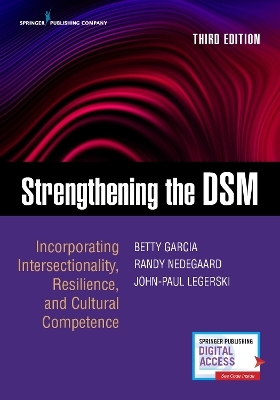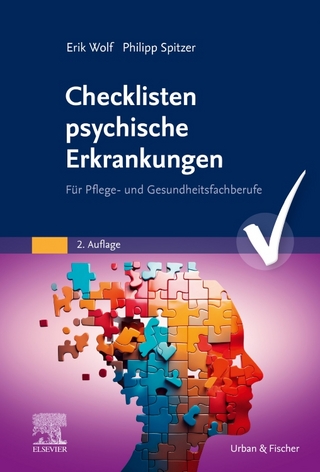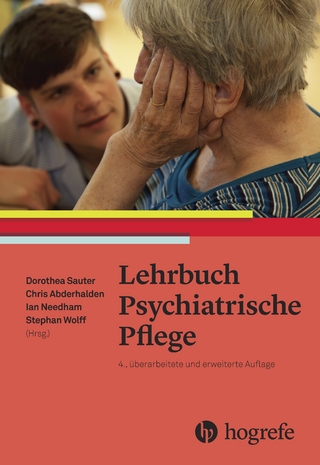
Strengthening the DSM, Third Edition
Springer Publishing Co Inc (Verlag)
978-0-8261-6444-5 (ISBN)
Note to Readers: Publisher does not guarantee quality or access to any included digital components if book is purchased through a third-party seller.
This essential companion to the DSM uniquely integrates intersectionality and resilience that helps mental health practitioners assess clients from a strength-based perspective. The third edition expands the section on neurocognitive disorders to include traumatic brain injury, includes more information on assessment and treatment of common childhood disorders, and brings a new focus on the impact of today’s culture wars and their impact on mental health professionals, policy, and clients Also new to the third edition is an emphasis on meta-analysis literature and a module on wellbeing discussing neuroscience and wellness concepts in relation to a strengths-based approach to diagnosis.
By demonstrating how to practically integrate diversity and intersectionality into the diagnostic process rather than limiting assessment to a purely problem-focused diagnostic label, this successful textbook strengthens the DSM for social workers and other mental health practitioners by promoting the inclusion of intersectionality, resiliency, culture, spirituality, and community into practice. It includes multiple case studies featuring complex, real life scenarios that offer a greater depth of learning by demonstrating how a strength-based assessment of the whole person can lead to more effective and successful treatment. Discussion questions promote critical thinking, key points in each chapter highlight and reinforce important concepts, and abundant web resources encourage additional study. The book also includes a robust instructor package. Purchase of the print edition includes access to Ebook format.
New to the Third Edition:Adds traumatic brain injury to neurocognitive disorders section
Expands information on treatment of common childhood disorders
Emphasizes meta-analysis literature
Discusses neuroscience and wellness concepts in relation to a strengths-based approach to diagnosis
Focuses on wellness and health care delivery in the context of today’s culture wars
Key Features:Delivers a unique formulation integrating intersectionality and resilience to provide strengths-based assessment and treatment
Demonstrates the rationale for strengths-based DSM practice
Includes real-life case scenarios for complex problem-solving
Uses a standard format for each disorder for quick access to information
Reviews key literature on disorders and evidence-based best practices
Provides classroom questions and activities to foster critical thinking
Identifies professional and scholarly activities to promote increased effectiveness in diagnosis
Betty Garcia, PhD, LCSW, is a professor Emerita at California State University, Fresno, Department of Social Work Education and is a licensed clinical social worker. Randy Nedegaard, PhD, LCSW, LP, is an associate professor at California State University, Fresno, Department of Social Work Education and is a licensed clinical social worker and licensed psychologist. John-Paul “JP” Legerski, PhD, LP, is an associate professor at University of North Dakota (UND), Department of Psychology, where he teaches graduate and undergraduate courses in child psychology, theories of psychology, therapeutic interventions, and development across the lifespan.
Section One: Framework and Introduction to the Diversity/Resiliency Formulation
1. A Conceptual Framework for the Intersectionality/Resiliency Formulation
2. Adding Intersectionality and Resiliency to the Diagnostic Process: A Formulation
Section Two: Diagnostic Categories
3. Depressive and Bipolar Disorders
4. Anxiety Disorders
5. Traumatic and Stressor-Related Disorders
6. Common Disorders of Childhood
7. Neurocognitive Disorders: Alzheimer’s Disease and Traumatic Brain Disorder
8. Schizophrenia Spectrum and other Psychotic Disorders
9. Co-occurring Disorders
Section Three: Thinking Forward: Challenges in Strengthening DSM Practices
10. Emerging Perspectives for Effective Mental Health Practice in a Cultural Wars Context
11. Future Directions
| Erscheinungsdatum | 02.11.2020 |
|---|---|
| Zusatzinfo | 2 Illustrations |
| Verlagsort | New York |
| Sprache | englisch |
| Maße | 178 x 254 mm |
| Themenwelt | Medizin / Pharmazie ► Gesundheitswesen |
| Medizin / Pharmazie ► Medizinische Fachgebiete ► Psychiatrie / Psychotherapie | |
| Pflege ► Fachpflege ► Neurologie / Psychiatrie | |
| ISBN-10 | 0-8261-6444-7 / 0826164447 |
| ISBN-13 | 978-0-8261-6444-5 / 9780826164445 |
| Zustand | Neuware |
| Haben Sie eine Frage zum Produkt? |
aus dem Bereich


